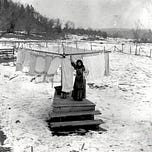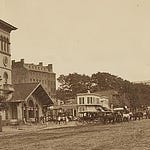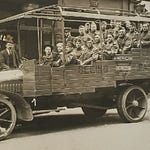It is April 14, 1906.
President Theodore Roosevelt has traveled to the grounds of the US Capitol
where he will lay the cornerstone of the Cannon House Office Building.


He had been reelected to office in a landslide sixteen months before
as the champion of progressive reforms
intended to regulate industry and mitigate the effects
of industrial capitalism on individuals and communities.
Now, in a new Gilded Age, Roosevelt’s words have renewed relevance.1


“[T]he wild preachers of unrest and discontent,
the wild agitators against the entire existing order,
the men who act crookedly,
whether because of sinister design or from mere puzzle-headedness,

the men who preach destruction
without proposing any substitute for what they intend to destroy,
or who propose a substitute which would be far worse than the existing evils,
all these men are the most dangerous opponents of real reform.

“If they get their way they will lead the people into a deeper pit
than any into which they could fall under the present system.


If they fail to get their way they will still do incalculable harm
by provoking the kind of reaction which,
in its revolt against the senseless evil of their teaching,
would enthrone more securely than ever
the very evils which their misguided followers believe they are attacking.

“More important than [anything] else
is the development of the broadest sympathy of man for man.


The welfare of the wage-worker,
the welfare of the tiller of the soil,
upon these depend the welfare of the entire country;
their good is not to be sought in pulling down others;
but their good must be the prime object of all our statesmanship.


“Materially we must strive to secure
a broader economic opportunity for all men,
so that each shall have a better chance to show the stuff of which he is made.

Spiritually and ethically
we must strive to bring about clean living
and right thinking.


“We appreciate that the things of the body are important;
but we appreciate also that
the things of the soul are immeasurably more important.

“The foundation stone of national life is,
and ever must be,
the high individual character of the average citizen.”
I’ll see you tomorrow.
— Brenda
The speech has been edited for brevity.












